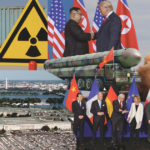By Samuel Hickey Iran’s nuclear program continues to expand and become less transparent with Iran limiting UN inspectors’ access to nuclear sites. Further, there remain monitoring disputes separate from the deal over access to Iranian facilities that has led the head of the UN’s nuclear watchdog to complain about an “astonishing” lack of communication. The urgency for […]
Fact Sheet: Low-Enriched Uranium for Naval Reactors
Congress is considering whether to continue research that started in 2016 into using low-enriched uranium (LEU) to replace weapon-grade highly-enriched uranium (HEU) to fuel naval nuclear propulsion reactors. Such a switch would reduce risks of nuclear proliferation and avoid the need to restart production of weapons-grade uranium for the first time since 1992. Rapidly Closing […]
Can the Iran nuclear deal be saved?
Research Analyst Samuel Hickey was quoted in a Vox article about the challenges to reaching an agreement on a possible revival of the Iran nuclear deal. Iran will likely argue that the United States is the one that blew the deal up, and Tehran stayed in compliance for a year, so it’s up to the […]
Arms Control in a Divided America
The Center for Arms Control and Non-Proliferation hosted our 2021 annual conference, “Arms Control in a Divided America,” on November 2, 2021. Our event participants, including Members of Congress and arms control experts, dove into an under-discussed but critical topic: what happened to bipartisanship when it comes to dealing with the world’s most dangerous weapons, […]
Fact Sheet: Congress’ Options on Civil Nuclear Waste Disposal
The disposal of commercial spent nuclear fuel is an environmental and economic responsibility for the United States government. Successive administrations have failed to find a solution since the nuclear chain-reaction was envisioned for civilian energy generation in 1946. Through the Nuclear Waste Policy Act of 1982 (NWPA), Congress assigned the management and disposal of spent nuclear fuel to the […]

